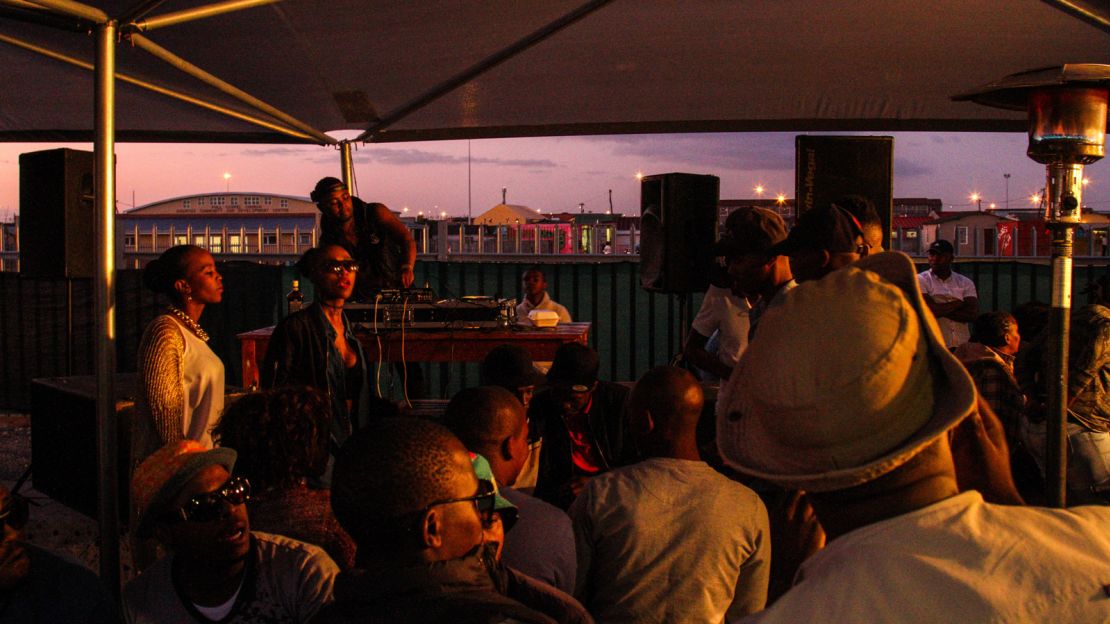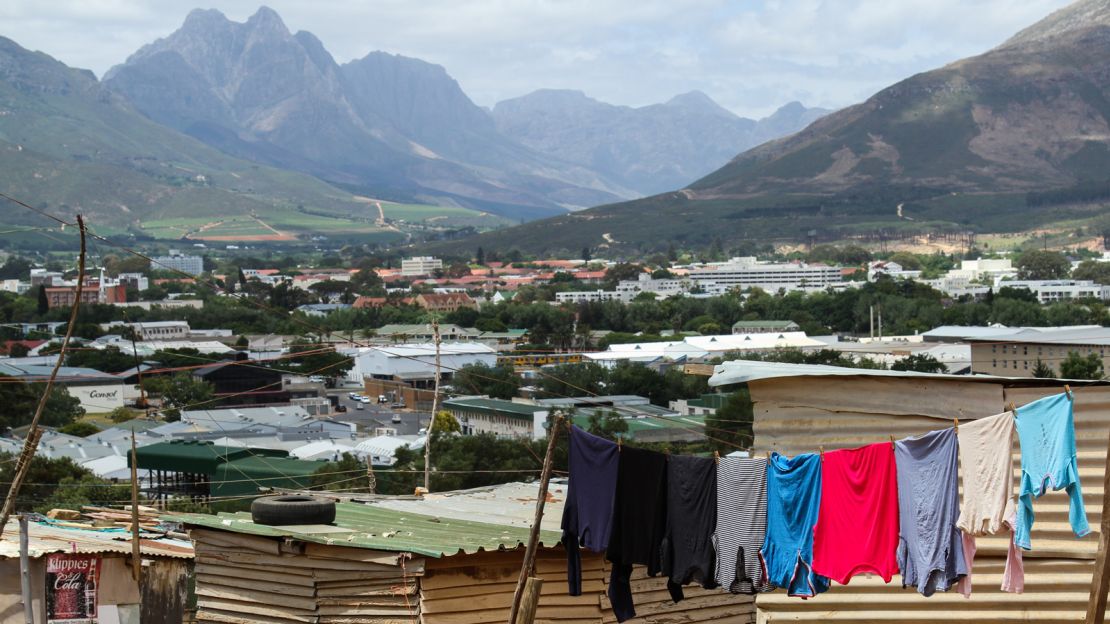Lookout Hill is the highest point of the aptly named Cape Flats.
Though it’s little more than a small sand dune, the panoramic views from the wooden platform at the top stretch right across Khayelitsha, Cape Town’s biggest township – home to anywhere between 300,000 and three million people, depending on who you ask.
During South Africa’s apartheid regime, Khayelitsha and the rest of the township “ghettos” that comprise the Cape Flats became known as “apartheid’s dumping ground” for people of color.
Even today, 21 years into democracy, the stories usually told of these neighborhoods speak of poverty, rampant crime and socioeconomic marginalization from the city center and its leafy (and predominantly white) suburbs.
Lookout Hill; Cnr Mew Way & Spine Road, Ilitha Park, Khayelitsha, Cape Town; +27 (0)21 361 7098
Seeing the big picture
But to Buntu Matole and Ayanda Cuba – two local social entrepreneurs – the view’s very different.
From our vantage point at the top of the hill, they show me various landmarks and share their ideas for developing them.
There’s an empty patch of ground at the end of the road that they’ve earmarked for an African food market.
Close to the highway at the far end of Khayelitsha, there’s a derelict playing field they hope to turn into a sustainable sports complex.
To Buntu and Ayanda, Khayelitsha is a place full of opportunities, bursting with potential.
As I walk back down onto the bustling Spine Road and into a cacophony of bass music, sizzling chicken and tooting car horns, it’s soon apparent that Matole and Cuba are not alone in their thinking.
Business is booming
Just a minute’s walk from Lookout Hill, housed in a metal shipping container, is Espinaca Innovations, a popular express bakery that makes artisanal spinach bread and muffins in the hope of encouraging local residents to lead healthier lifestyles.
The owner, Lufefe Nomjana, is another young local who started his business with just R40 (less than $3) to his name.
Nomjana says he plans to extend his booming bakery business into a cafe and deli to capitalize on Spine Road’s growing tourism market.
A burgeoning local coffee culture has sprung up since the success of Department of Coffee, Khayelitsha’s first “real” coffee shop, which opened in late 2012.
Ikasi culture
A little farther down the road, I stop at a brand new lounge bar called Deep Kultsha Cafe.
One of the owners, Sabelo Simbeku, invites me inside. He and his business partners are busy setting up for their grand opening that weekend.
Deep Kultsha Cafe’s the highest building on the street, and there are good views of the surrounding neighborhood from the floor-to-ceiling windows.
The lavish leather furnishings and sophisticated liquor selection are clearly aimed at a growing local middle-class market.
Simbeku says they’re also hoping to attract a wider audience.
“The perception of the township is changing, slowly but surely. Gradually white people are coming to Khayelitsha also,” he says. “The space is open, the market is open. Their fear is slowly dying down. They are coming here to enjoy themselves and experience ikasi (township) culture.”
Espinaca Innovations; 42 Spine Road, Khayelitsha; +27 (0) 73 095 0119
Department of Coffee; 158 Ntlazane Street, Khayelitsha; +27 (0) 73 300 9519
Deep Kultsha Cafe; 39-41 Mthawelanga Street, Ilitha Park, Khayelitsha; +27 (0) 60 900 9607
‘There’s a lot we can do here’

Mfundo Mbeki, the owner of Rands – a fashionable open-air party spot around the corner from Deep Kultsha Cafe – agrees.
“We’ve seen a lot of people who don’t live in Khayelitsha coming here,” Mbeki says. “Khayelitsha has a lot to offer in terms of bringing tourism. There is a lot that we can do here.”
Like everyone else I’ve spoken to so far, Mbeki is young and grew up locally. He says that since Rands opened last August it’s been full to bursting every weekend.
It’s not only Khayelitsha that is challenging the image of Cape Town’s townships as peripheral, impoverished places with little to offer tourists beyond a backdrop for the tick-the-box “township tours” some disdainfully disdainfully call “poverty safaris.”
Rands; Shop 6, 3 Monza Street, Khayelitsha; +27 (0) 84 388 9977
Langa, the heart of Cape Town
Iain Harris is the founder and director of Coffeebeans Routes, a multi award-winning experiential tour operator that aims to offer a more immersive approach.
He points out that on maps of Greater Cape Town, Langa, the city’s oldest township, is actually right at the heart, rather than on the edges.
“People need to think differently about space,” he says. “People think that periphery is where the danger is. When they start to think of Langa or Khayelitsha as being central rather than peripheral there’s a natural shift.”
The ongoing development of the Langa Quarter looks set to further contribute to that change in mindset.
This so-called social enterprise precinct and hub of contemporary arts, culture and design is the brainchild of London-born Tony Elvin.
Elvin says he hopes the Langa Quarter will soon be to Cape Town what the French Quarter is to New Orleans.
“The idea is to create an aspirational, cool place, not just for tourists – to create a new space in Cape Town where Capetonians can also go, not just for a history lesson, but to listen to some great jazz, chill out and have a good time.”
Langa Quarter; Ndabeni Street, Langa, Cape Town; +27 (0) 21 694 3717
Hearty township recipes

A little further afield in the fertile rolling hills of the Cape Winelands, professional chef Yondela Tyawa’s Shack Fusion Kitchen in the informal settlement of Enkanini is also challenging preconceptions about what visitors can find in the townships.
Tyawa treats guests to hearty township recipes fused with contemporary fine dining flair and presentation.
Her brother Anathi’s powerful artworks adorn the shack walls, showing an equally unexpected blend of romantic and modern styles and themes.
This experience forms part of a Coffeebeans Routes offering dubbed Creative Cape Town, which also takes tourists around Khayelitsha and Langa, including the Department of Coffee, Espinaca Innovations and the Langa Quarter.
As Harris from Coffeebeans Routes would have it, the focus of the Creative Cape Town tour reflects a growing sense from those on the ground that although townships remain “museums of South Africa’s apartheid past,” they’re also central breeding grounds of Cape Town’s urban creativity and contemporary culture.
Says Harris, they’re “slowly shedding their museum skin as they start to shape what the future of the city looks like, and create a new narrative.”
It’s an enthralling revolution to witness.
Shack Fusion Kitchen; Enkanini, Stellenbosch; +27 (0) 78 648 8599
Christopher Clark is a British freelance writer and wanderer based in Cape Town. He has traveled through and written about 13 African countries for more than 30 local and international publications and has twice been featured as one of South Africa’s best writers by The Big Issue magazine.

















